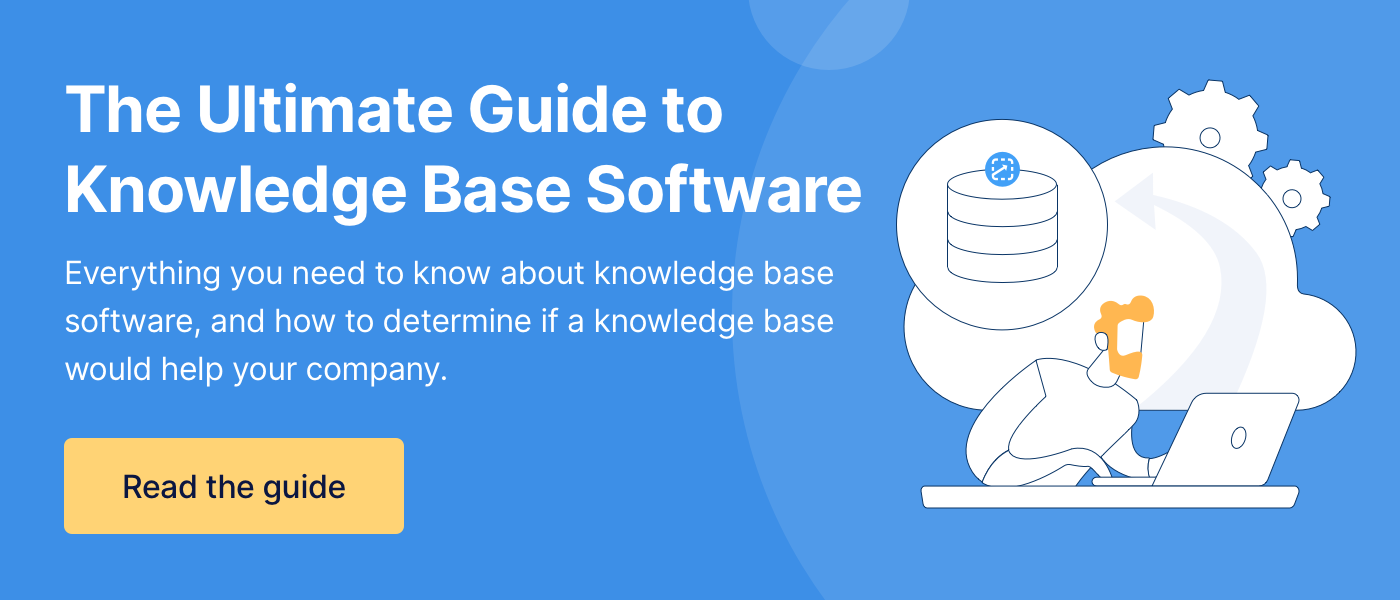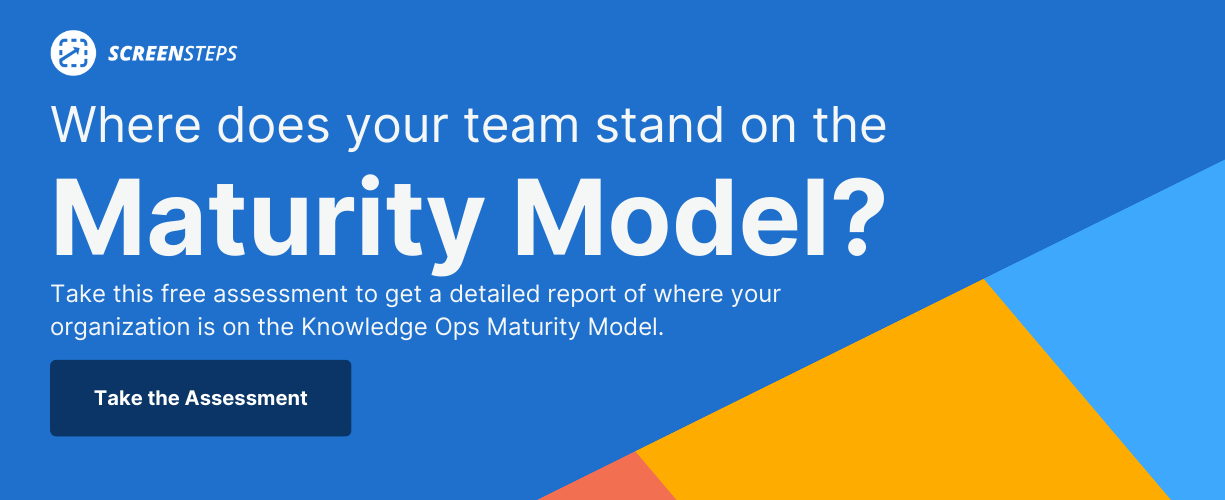Knowledge in Business: Defining Key Terms in Knowledge Management
The business knowledge world … it’s a mess.
Or, at least, how we define knowledge strategies, solutions, software, etc. is confusing. There are tons of different terms that all seem to mean the same thing.
As the Content Marketing Manager for ScreenSteps — a knowledge ops solution — I’ve researched a wide range of knowledge terms trying to understand the difference between things like knowledge management and knowledge bases.
Ultimately, I’ve learned that most terms and solutions are similar, — they just have small nuances that make them different.
The thing is you are probably looking for a specific solution for your company, so what should you be Googling to find what you need?
That’s why I wrote this blog post. Here is a glossary of knowledge terms for business. You can compare the definitions side-by-side so that your research can be more lucrative and pointed.
Quick definitions
- Business knowledge: Information that is necessary for your business operations to run smoothly.
- Knowledge transfer: Passing knowledge from one person to another.
- Knowledge management: A strategy for collecting and storing your company knowledge.
- Knowledge operations (knowledge ops): A strategy for transferring your business knowledge that involves a collection of technologies and habits.
What is business knowledge?
Knowledge in business is the information that you want everyone to know company-wide. It is a culmination of capability, experience, skills, and proficiency.
It is expert insight. Essentially, your business knowledge is the standard. It is what you want every employee to understand and how you want them to perform their jobs.
Your business knowledge affects all aspects of your business.
Within business knowledge, there are many different strategies and software solutions. I’ve broken the below definitions into categories so it is easy to compare the different business knowledge elements.
Knowledge transfer: The main challenge
Knowledge transfer is passing knowledge from one person to another person. More specifically, it is the act of transitioning knowledge from your experts to other employees.
Companies transfer knowledge so that employees can confidently and independently handle tasks the same way that your experts would.
There are many different forms of knowledge transfer, including:
- In-person or virtual employee training class
- On-demand video courses
- Documentation and digital guides
- One-on-one coaching
- Etc.
The challenge with knowledge transfer is figuring out what approach works best. You want knowledge that is accessible and supports your employee. That is where the different knowledge transfer strategies come in.
Knowledge strategies for businesses
There are many approaches to managing and transferring knowledge in business. Knowledge management and knowledge ops are similar but have slight differences in their overall purposes.
Knowledge management
A knowledge management strategy is the plan for collecting, creating, organizing, and sharing information across your organization.
The strategy involves centralizing all your company information and resources into one location.
A knowledge management approach is focused on collecting and storing information. It is more about having the information documented, not as much about how the information will be used.
Knowledge operations (knowledge ops)
Knowledge ops (or knowledge operations) is the strategy you use to transfer your business knowledge. It is a collection of technologies and habits that allow employees to work independently without needing additional support from supervisors or subject matter experts.
The strategy involves both how you record and distribute your digital guides as well as how you train your employees. It’s a total knowledge transfer approach.
While knowledge management is information-centric, knowledge ops are end-user focused. It is focused on how the information will be used to support employees handling their work.
Knowledge management vs knowledge ops
Take a closer look at how knowledge management compares to knowledge ops with this comparison article on the two knowledge approaches.
Knowledge management software
Knowledge management software is a cloud-based platform that helps businesses organize their company information and resources.
Also considered a “knowledge management system,” it centralizes knowledge in one spot. It allows you to collect, create, store, and share content in a single platform.
What knowledge tools can you use?
There are many different tools that fit into the knowledge management system category. A knowledge management system includes:
- Knowledge base software
- Knowledge ops platform
- Corporate wiki
- Intranet
- Document library or document repository
(Below are definitions for each of these knowledge management software options.)
1. Knowledge base
Knowledge base software is a platform where you can create, store, and share digital guides with your end-users. It is a one-stop shop for your company’s resources.
A knowledge base works as a digital library where your end-users can find any information they need to complete a task. It is a storage center for your digital guides, including step-by-step guides, call flows, how-to articles, checklists, reference sheets, and more.
The purpose of your knowledge base is to provide 24/7 support to your end-users. It gives them quick access to answers they need by putting those answers at their fingertips.
Problems it helps solve
- Centralized knowledge hub
- Dynamic and interactive articles
- Localized document creation
2. Knowledge ops platform
A knowledge ops platform (or knowledge operations platform) is a software solution that helps you manage and transfer knowledge more effectively and efficiently. It is a single source of truth where you can capture, catalog, and deliver knowledge to your end-users.
It has all the features of a knowledge base plus tools to write findable and followable digital guides and foundational courses for employee training.
The primary goal of a knowledge ops platform is to operationalize your company knowledge. Not only does it want to provide you with a space for creating and storing your guides, but the focus is helping your end-users do something on their own.
Problems it helps solve
- Centralized knowledge hub
- Knowledge transfer
- Dependent employees
- Handles complex procedures
- Employee training
3. Corporate wiki
A corporate wiki is a company website that centralizes all your knowledge. Essentially, it is Wikipedia but it only holds your company’s information.
The purpose of a wiki is to crowdsource information from employees and share that information. It is created through employee collaboration, meaning it is powered by employee contributions.
A wiki can either be private or public.
Problems it helps solve
- Centralized knowledge hub
- Employee collaboration
4. Intranet
An intranet is an internal company website. It is a private online network that serves as a central location for all company information. This goes beyond policies and procedures to support operations.
An intranet is also a place for the company to share announcements, upload files, send company updates, and more. It allows companies to communicate with their employees.
While you can often create a knowledge transfer portal within your intranet, it is usually a secondary function.
Problems it helps solve
- Centralized company hub
- Communication across large corporations
5. Document library
A document library is a place where you can store and share your documents. Also called a document repository, the cloud-based software is another option for creating a centralized location for your documents.
Unlike with the other software, you need a third-party application to create your documents. Typically, a document library is a cloud-based solution where you upload your Word documents, PDFs, PowerPoints, and other documents.
The sole purpose of a document library is to store your documents.
Problems it helps solve
- Centralized knowledge hub
Evaluate your business knowledge and build a strategy to make operations more efficient
As you can see, there are many options when it comes to managing your knowledge in business. Figuring out the right knowledge transfer strategy can be difficult.
The first step to improving knowledge management is understanding where you are at.
At ScreenSteps, we’ve developed the Knowledge Ops Maturity Model to help businesses evaluate the state of their knowledge operations and aspire to better knowledge transfer practices.
Evaluate how your business is managing and transferring your company knowledge with the Knowledge Ops Maturity Grader. This 5-minute self-evaluation will help you identify where your knowledge transfer strategy is currently and how to improve it.





